International Travel and Tourism Business Toolkit Report - HND
VerifiedAdded on 2023/01/12
|10
|3725
|74
Report
AI Summary
This report analyzes the travel and tourism business toolkit, focusing on revenue management, HR lifecycle, and legal and financial aspects within the industry. The report begins with an introduction to the travel and tourism industry and the chosen organization, TUI Group. It then delves into revenue management principles, including market segmentation, overbooking, and pricing strategies, and explores how the accommodation sector applies tools like PMS, channel managers, and booking engines to maximize profit. The report further examines the HR lifecycle stages for a travel agent role, emphasizing recruitment, education, motivation, and evaluation, and discusses a performance management plan. Finally, it addresses relevant legislation such as package travel regulations, air passenger duty, the Disability Discrimination Act, and the Development of Tourism Act, alongside financial statements and budgeting for business performance. The report provides a comprehensive overview of key business concepts within the travel and tourism sector.
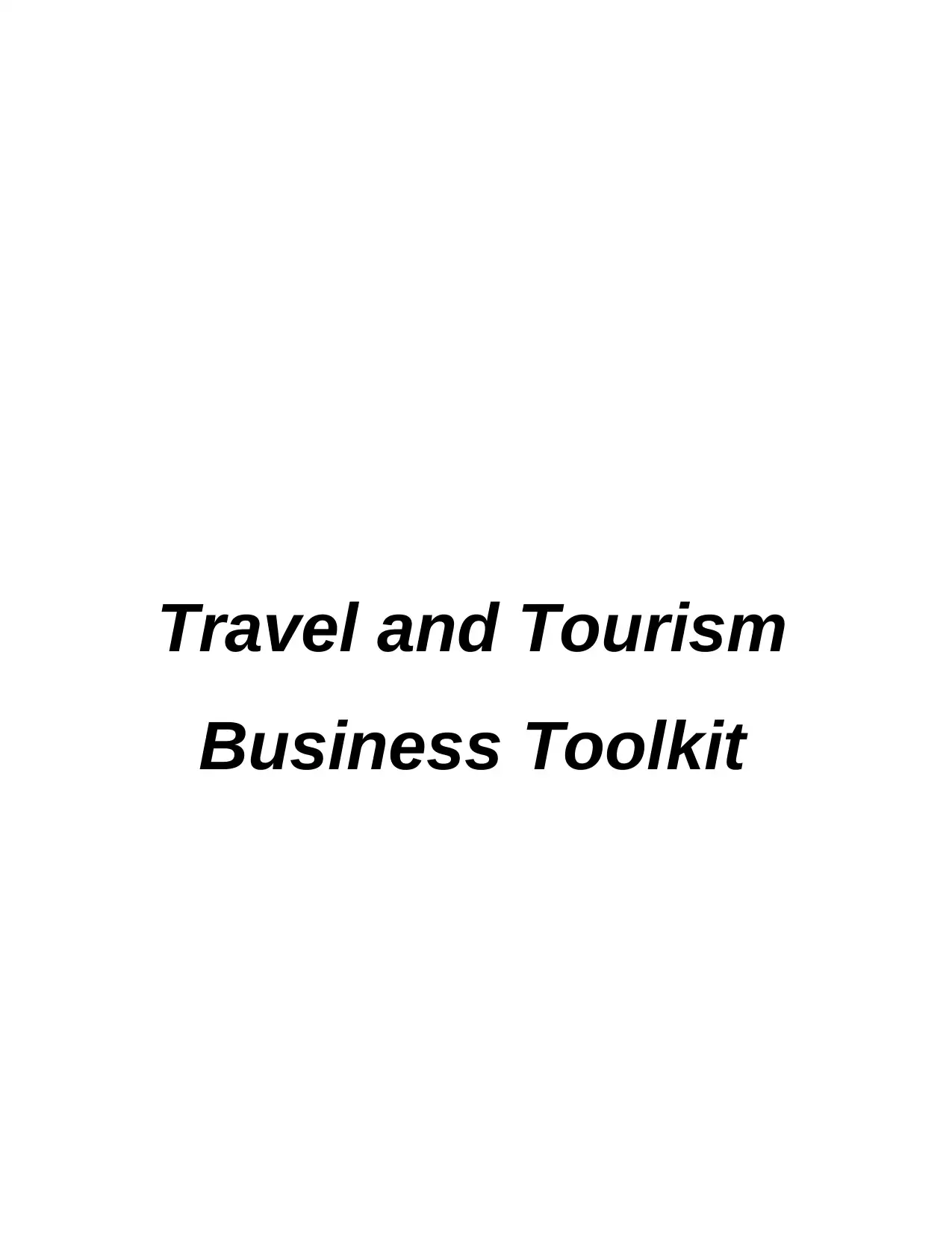
Travel and Tourism
Business Toolkit
Business Toolkit
Paraphrase This Document
Need a fresh take? Get an instant paraphrase of this document with our AI Paraphraser
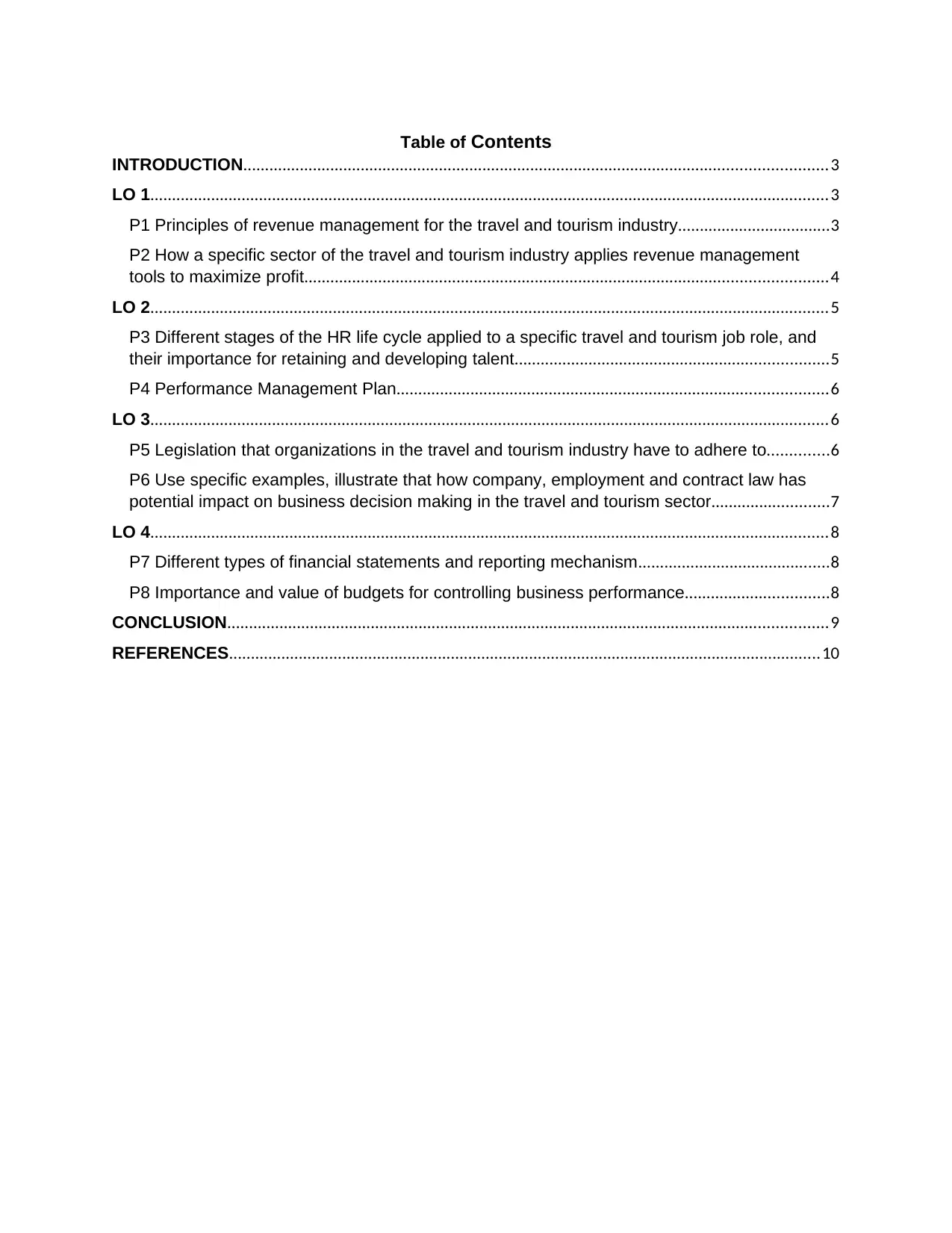
Table of Contents
INTRODUCTION......................................................................................................................................3
LO 1............................................................................................................................................................3
P1 Principles of revenue management for the travel and tourism industry...................................3
P2 How a specific sector of the travel and tourism industry applies revenue management
tools to maximize profit........................................................................................................................4
LO 2............................................................................................................................................................5
P3 Different stages of the HR life cycle applied to a specific travel and tourism job role, and
their importance for retaining and developing talent........................................................................5
P4 Performance Management Plan...................................................................................................6
LO 3............................................................................................................................................................6
P5 Legislation that organizations in the travel and tourism industry have to adhere to..............6
P6 Use specific examples, illustrate that how company, employment and contract law has
potential impact on business decision making in the travel and tourism sector...........................7
LO 4............................................................................................................................................................8
P7 Different types of financial statements and reporting mechanism............................................8
P8 Importance and value of budgets for controlling business performance.................................8
CONCLUSION..........................................................................................................................................9
REFERENCES........................................................................................................................................10
INTRODUCTION......................................................................................................................................3
LO 1............................................................................................................................................................3
P1 Principles of revenue management for the travel and tourism industry...................................3
P2 How a specific sector of the travel and tourism industry applies revenue management
tools to maximize profit........................................................................................................................4
LO 2............................................................................................................................................................5
P3 Different stages of the HR life cycle applied to a specific travel and tourism job role, and
their importance for retaining and developing talent........................................................................5
P4 Performance Management Plan...................................................................................................6
LO 3............................................................................................................................................................6
P5 Legislation that organizations in the travel and tourism industry have to adhere to..............6
P6 Use specific examples, illustrate that how company, employment and contract law has
potential impact on business decision making in the travel and tourism sector...........................7
LO 4............................................................................................................................................................8
P7 Different types of financial statements and reporting mechanism............................................8
P8 Importance and value of budgets for controlling business performance.................................8
CONCLUSION..........................................................................................................................................9
REFERENCES........................................................................................................................................10
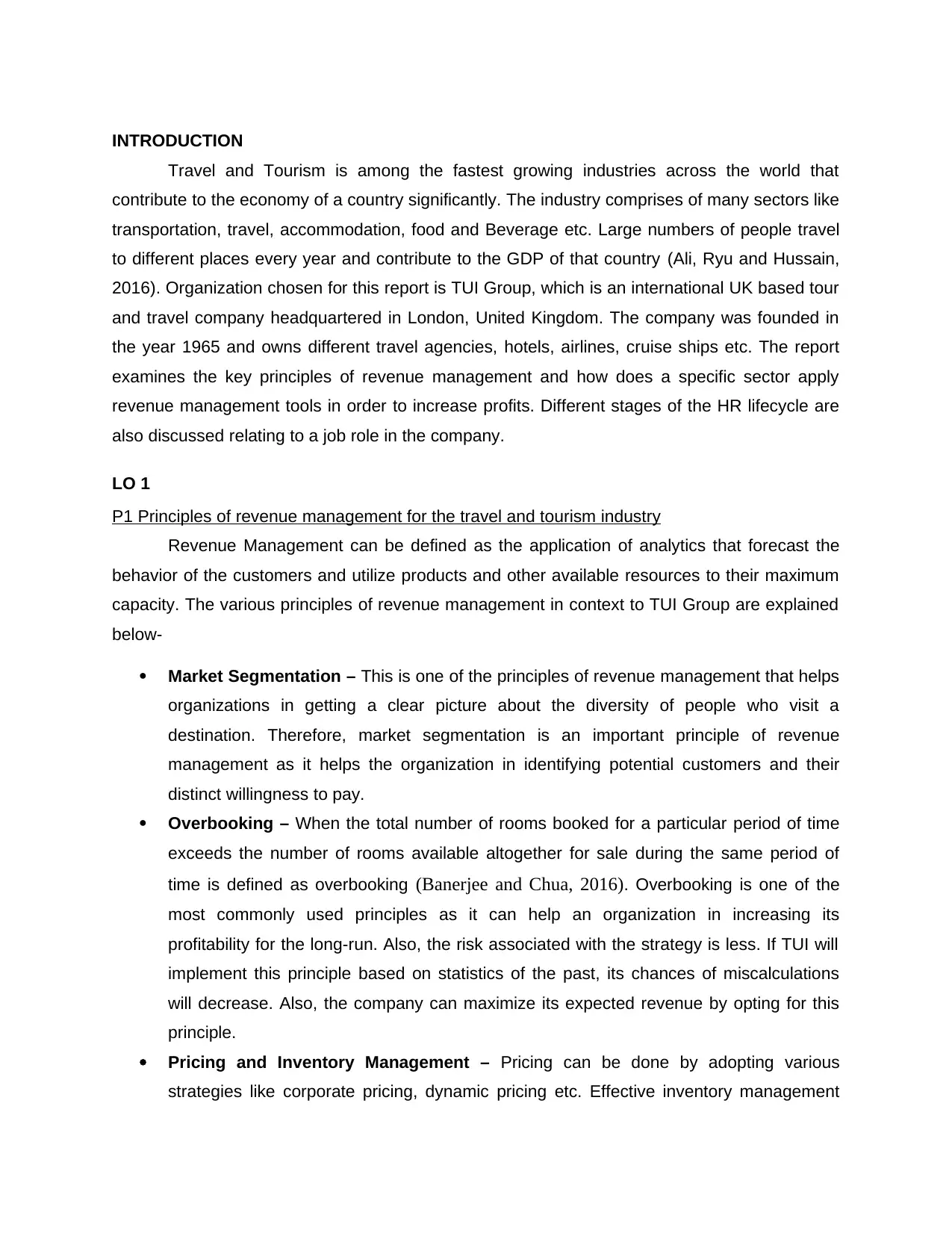
INTRODUCTION
Travel and Tourism is among the fastest growing industries across the world that
contribute to the economy of a country significantly. The industry comprises of many sectors like
transportation, travel, accommodation, food and Beverage etc. Large numbers of people travel
to different places every year and contribute to the GDP of that country (Ali, Ryu and Hussain,
2016). Organization chosen for this report is TUI Group, which is an international UK based tour
and travel company headquartered in London, United Kingdom. The company was founded in
the year 1965 and owns different travel agencies, hotels, airlines, cruise ships etc. The report
examines the key principles of revenue management and how does a specific sector apply
revenue management tools in order to increase profits. Different stages of the HR lifecycle are
also discussed relating to a job role in the company.
LO 1
P1 Principles of revenue management for the travel and tourism industry
Revenue Management can be defined as the application of analytics that forecast the
behavior of the customers and utilize products and other available resources to their maximum
capacity. The various principles of revenue management in context to TUI Group are explained
below-
Market Segmentation – This is one of the principles of revenue management that helps
organizations in getting a clear picture about the diversity of people who visit a
destination. Therefore, market segmentation is an important principle of revenue
management as it helps the organization in identifying potential customers and their
distinct willingness to pay.
Overbooking – When the total number of rooms booked for a particular period of time
exceeds the number of rooms available altogether for sale during the same period of
time is defined as overbooking (Banerjee and Chua, 2016). Overbooking is one of the
most commonly used principles as it can help an organization in increasing its
profitability for the long-run. Also, the risk associated with the strategy is less. If TUI will
implement this principle based on statistics of the past, its chances of miscalculations
will decrease. Also, the company can maximize its expected revenue by opting for this
principle.
Pricing and Inventory Management – Pricing can be done by adopting various
strategies like corporate pricing, dynamic pricing etc. Effective inventory management
Travel and Tourism is among the fastest growing industries across the world that
contribute to the economy of a country significantly. The industry comprises of many sectors like
transportation, travel, accommodation, food and Beverage etc. Large numbers of people travel
to different places every year and contribute to the GDP of that country (Ali, Ryu and Hussain,
2016). Organization chosen for this report is TUI Group, which is an international UK based tour
and travel company headquartered in London, United Kingdom. The company was founded in
the year 1965 and owns different travel agencies, hotels, airlines, cruise ships etc. The report
examines the key principles of revenue management and how does a specific sector apply
revenue management tools in order to increase profits. Different stages of the HR lifecycle are
also discussed relating to a job role in the company.
LO 1
P1 Principles of revenue management for the travel and tourism industry
Revenue Management can be defined as the application of analytics that forecast the
behavior of the customers and utilize products and other available resources to their maximum
capacity. The various principles of revenue management in context to TUI Group are explained
below-
Market Segmentation – This is one of the principles of revenue management that helps
organizations in getting a clear picture about the diversity of people who visit a
destination. Therefore, market segmentation is an important principle of revenue
management as it helps the organization in identifying potential customers and their
distinct willingness to pay.
Overbooking – When the total number of rooms booked for a particular period of time
exceeds the number of rooms available altogether for sale during the same period of
time is defined as overbooking (Banerjee and Chua, 2016). Overbooking is one of the
most commonly used principles as it can help an organization in increasing its
profitability for the long-run. Also, the risk associated with the strategy is less. If TUI will
implement this principle based on statistics of the past, its chances of miscalculations
will decrease. Also, the company can maximize its expected revenue by opting for this
principle.
Pricing and Inventory Management – Pricing can be done by adopting various
strategies like corporate pricing, dynamic pricing etc. Effective inventory management
⊘ This is a preview!⊘
Do you want full access?
Subscribe today to unlock all pages.

Trusted by 1+ million students worldwide
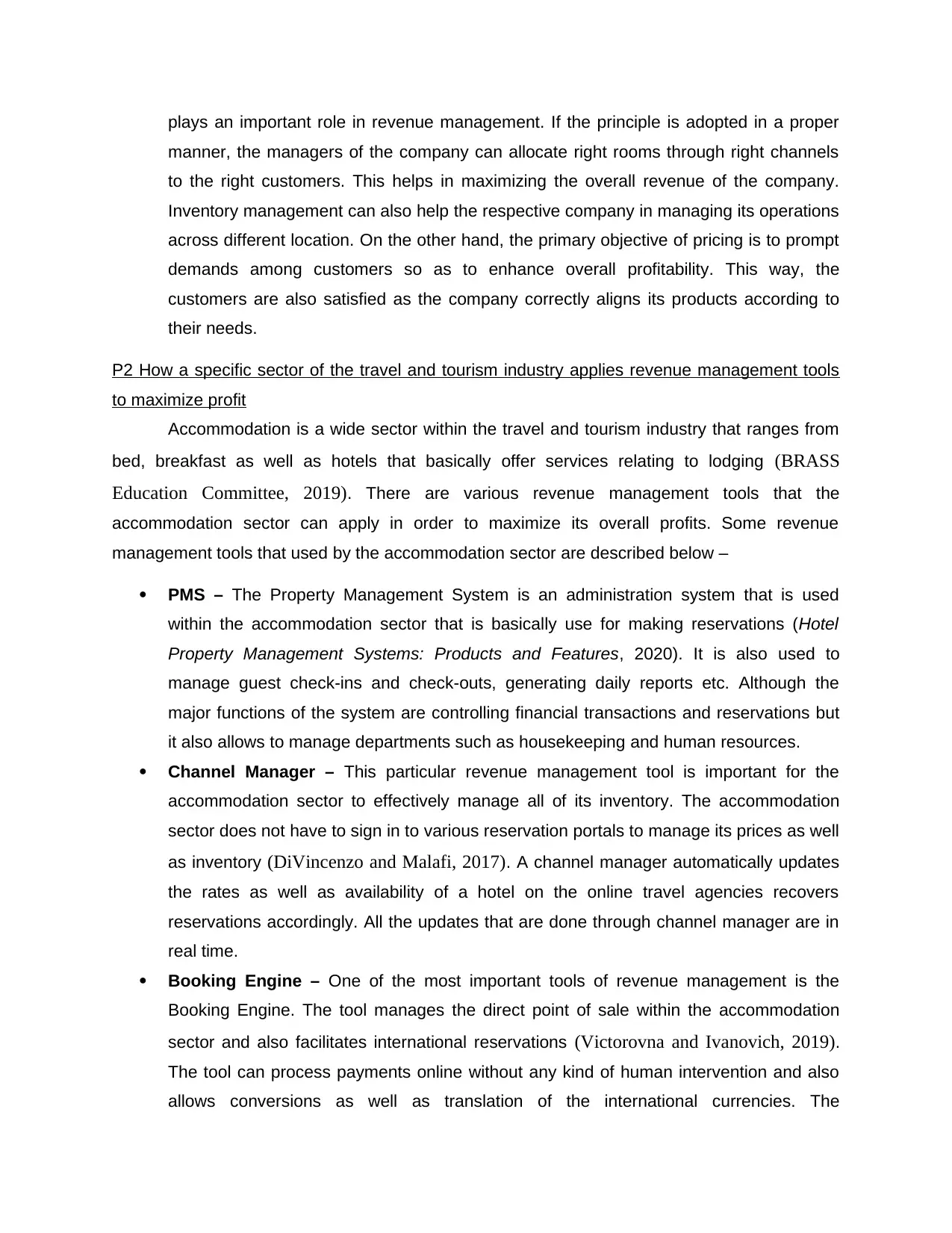
plays an important role in revenue management. If the principle is adopted in a proper
manner, the managers of the company can allocate right rooms through right channels
to the right customers. This helps in maximizing the overall revenue of the company.
Inventory management can also help the respective company in managing its operations
across different location. On the other hand, the primary objective of pricing is to prompt
demands among customers so as to enhance overall profitability. This way, the
customers are also satisfied as the company correctly aligns its products according to
their needs.
P2 How a specific sector of the travel and tourism industry applies revenue management tools
to maximize profit
Accommodation is a wide sector within the travel and tourism industry that ranges from
bed, breakfast as well as hotels that basically offer services relating to lodging (BRASS
Education Committee, 2019). There are various revenue management tools that the
accommodation sector can apply in order to maximize its overall profits. Some revenue
management tools that used by the accommodation sector are described below –
PMS – The Property Management System is an administration system that is used
within the accommodation sector that is basically use for making reservations (Hotel
Property Management Systems: Products and Features, 2020). It is also used to
manage guest check-ins and check-outs, generating daily reports etc. Although the
major functions of the system are controlling financial transactions and reservations but
it also allows to manage departments such as housekeeping and human resources.
Channel Manager – This particular revenue management tool is important for the
accommodation sector to effectively manage all of its inventory. The accommodation
sector does not have to sign in to various reservation portals to manage its prices as well
as inventory (DiVincenzo and Malafi, 2017). A channel manager automatically updates
the rates as well as availability of a hotel on the online travel agencies recovers
reservations accordingly. All the updates that are done through channel manager are in
real time.
Booking Engine – One of the most important tools of revenue management is the
Booking Engine. The tool manages the direct point of sale within the accommodation
sector and also facilitates international reservations (Victorovna and Ivanovich, 2019).
The tool can process payments online without any kind of human intervention and also
allows conversions as well as translation of the international currencies. The
manner, the managers of the company can allocate right rooms through right channels
to the right customers. This helps in maximizing the overall revenue of the company.
Inventory management can also help the respective company in managing its operations
across different location. On the other hand, the primary objective of pricing is to prompt
demands among customers so as to enhance overall profitability. This way, the
customers are also satisfied as the company correctly aligns its products according to
their needs.
P2 How a specific sector of the travel and tourism industry applies revenue management tools
to maximize profit
Accommodation is a wide sector within the travel and tourism industry that ranges from
bed, breakfast as well as hotels that basically offer services relating to lodging (BRASS
Education Committee, 2019). There are various revenue management tools that the
accommodation sector can apply in order to maximize its overall profits. Some revenue
management tools that used by the accommodation sector are described below –
PMS – The Property Management System is an administration system that is used
within the accommodation sector that is basically use for making reservations (Hotel
Property Management Systems: Products and Features, 2020). It is also used to
manage guest check-ins and check-outs, generating daily reports etc. Although the
major functions of the system are controlling financial transactions and reservations but
it also allows to manage departments such as housekeeping and human resources.
Channel Manager – This particular revenue management tool is important for the
accommodation sector to effectively manage all of its inventory. The accommodation
sector does not have to sign in to various reservation portals to manage its prices as well
as inventory (DiVincenzo and Malafi, 2017). A channel manager automatically updates
the rates as well as availability of a hotel on the online travel agencies recovers
reservations accordingly. All the updates that are done through channel manager are in
real time.
Booking Engine – One of the most important tools of revenue management is the
Booking Engine. The tool manages the direct point of sale within the accommodation
sector and also facilitates international reservations (Victorovna and Ivanovich, 2019).
The tool can process payments online without any kind of human intervention and also
allows conversions as well as translation of the international currencies. The
Paraphrase This Document
Need a fresh take? Get an instant paraphrase of this document with our AI Paraphraser
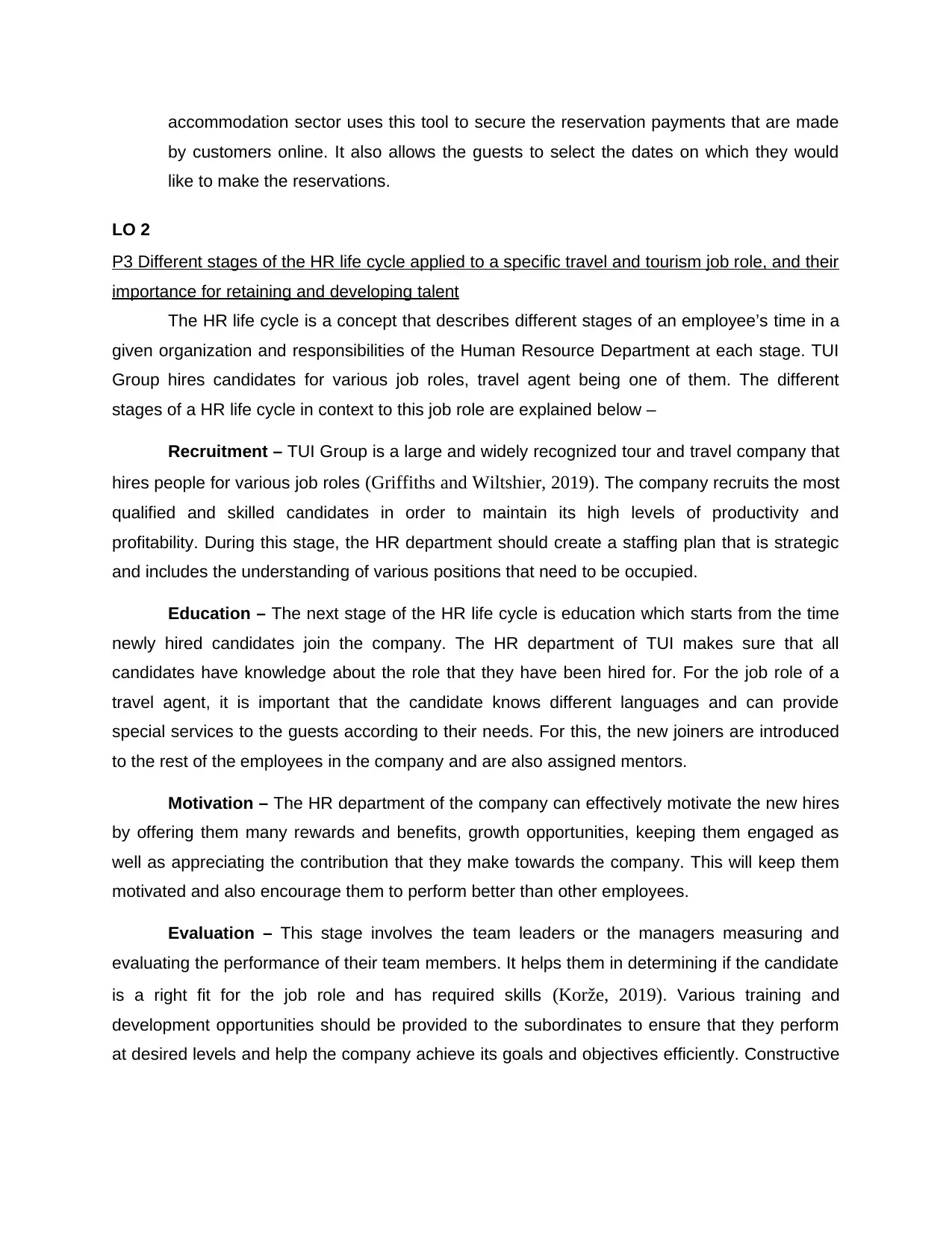
accommodation sector uses this tool to secure the reservation payments that are made
by customers online. It also allows the guests to select the dates on which they would
like to make the reservations.
LO 2
P3 Different stages of the HR life cycle applied to a specific travel and tourism job role, and their
importance for retaining and developing talent
The HR life cycle is a concept that describes different stages of an employee’s time in a
given organization and responsibilities of the Human Resource Department at each stage. TUI
Group hires candidates for various job roles, travel agent being one of them. The different
stages of a HR life cycle in context to this job role are explained below –
Recruitment – TUI Group is a large and widely recognized tour and travel company that
hires people for various job roles (Griffiths and Wiltshier, 2019). The company recruits the most
qualified and skilled candidates in order to maintain its high levels of productivity and
profitability. During this stage, the HR department should create a staffing plan that is strategic
and includes the understanding of various positions that need to be occupied.
Education – The next stage of the HR life cycle is education which starts from the time
newly hired candidates join the company. The HR department of TUI makes sure that all
candidates have knowledge about the role that they have been hired for. For the job role of a
travel agent, it is important that the candidate knows different languages and can provide
special services to the guests according to their needs. For this, the new joiners are introduced
to the rest of the employees in the company and are also assigned mentors.
Motivation – The HR department of the company can effectively motivate the new hires
by offering them many rewards and benefits, growth opportunities, keeping them engaged as
well as appreciating the contribution that they make towards the company. This will keep them
motivated and also encourage them to perform better than other employees.
Evaluation – This stage involves the team leaders or the managers measuring and
evaluating the performance of their team members. It helps them in determining if the candidate
is a right fit for the job role and has required skills (Korže, 2019). Various training and
development opportunities should be provided to the subordinates to ensure that they perform
at desired levels and help the company achieve its goals and objectives efficiently. Constructive
by customers online. It also allows the guests to select the dates on which they would
like to make the reservations.
LO 2
P3 Different stages of the HR life cycle applied to a specific travel and tourism job role, and their
importance for retaining and developing talent
The HR life cycle is a concept that describes different stages of an employee’s time in a
given organization and responsibilities of the Human Resource Department at each stage. TUI
Group hires candidates for various job roles, travel agent being one of them. The different
stages of a HR life cycle in context to this job role are explained below –
Recruitment – TUI Group is a large and widely recognized tour and travel company that
hires people for various job roles (Griffiths and Wiltshier, 2019). The company recruits the most
qualified and skilled candidates in order to maintain its high levels of productivity and
profitability. During this stage, the HR department should create a staffing plan that is strategic
and includes the understanding of various positions that need to be occupied.
Education – The next stage of the HR life cycle is education which starts from the time
newly hired candidates join the company. The HR department of TUI makes sure that all
candidates have knowledge about the role that they have been hired for. For the job role of a
travel agent, it is important that the candidate knows different languages and can provide
special services to the guests according to their needs. For this, the new joiners are introduced
to the rest of the employees in the company and are also assigned mentors.
Motivation – The HR department of the company can effectively motivate the new hires
by offering them many rewards and benefits, growth opportunities, keeping them engaged as
well as appreciating the contribution that they make towards the company. This will keep them
motivated and also encourage them to perform better than other employees.
Evaluation – This stage involves the team leaders or the managers measuring and
evaluating the performance of their team members. It helps them in determining if the candidate
is a right fit for the job role and has required skills (Korže, 2019). Various training and
development opportunities should be provided to the subordinates to ensure that they perform
at desired levels and help the company achieve its goals and objectives efficiently. Constructive
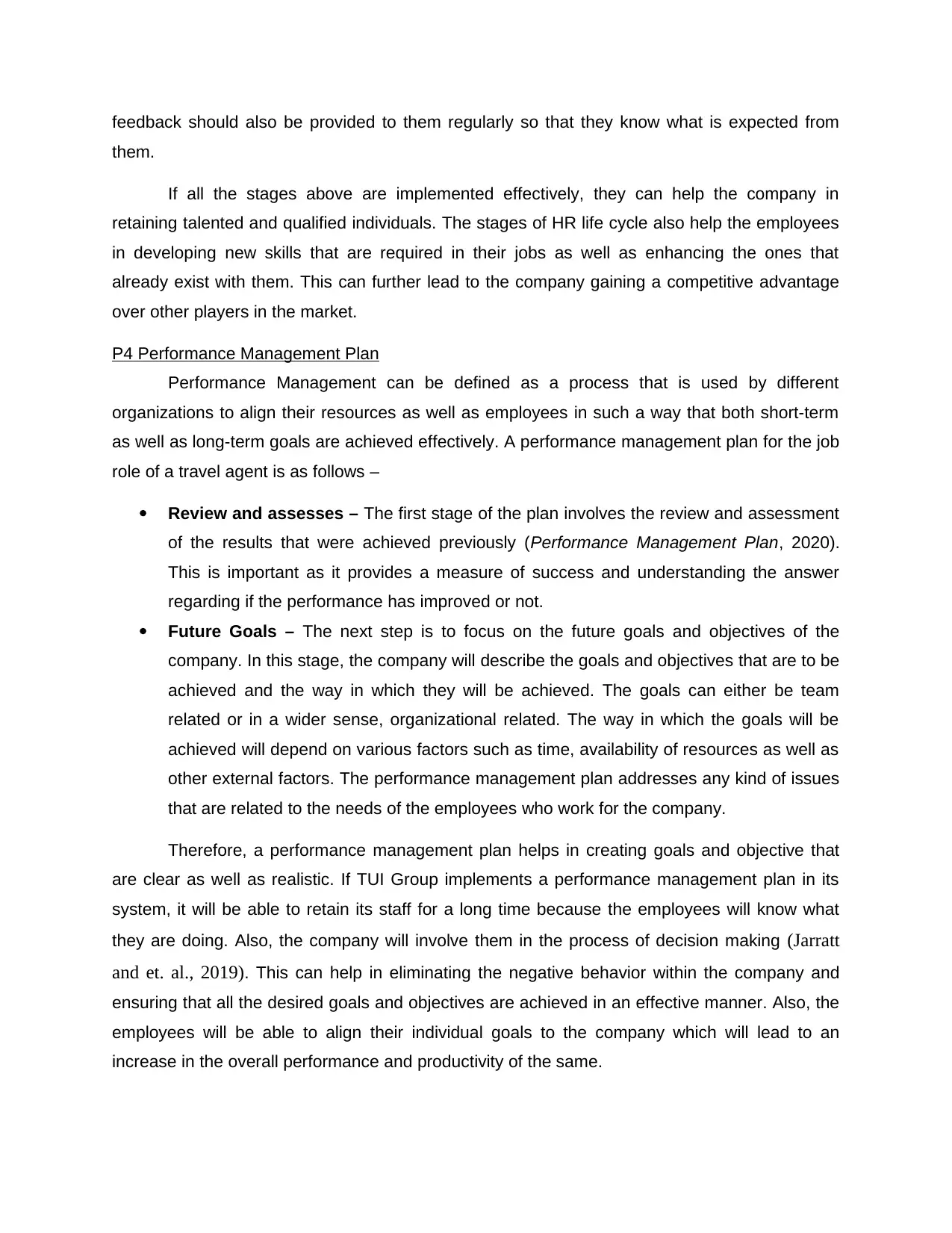
feedback should also be provided to them regularly so that they know what is expected from
them.
If all the stages above are implemented effectively, they can help the company in
retaining talented and qualified individuals. The stages of HR life cycle also help the employees
in developing new skills that are required in their jobs as well as enhancing the ones that
already exist with them. This can further lead to the company gaining a competitive advantage
over other players in the market.
P4 Performance Management Plan
Performance Management can be defined as a process that is used by different
organizations to align their resources as well as employees in such a way that both short-term
as well as long-term goals are achieved effectively. A performance management plan for the job
role of a travel agent is as follows –
Review and assesses – The first stage of the plan involves the review and assessment
of the results that were achieved previously (Performance Management Plan, 2020).
This is important as it provides a measure of success and understanding the answer
regarding if the performance has improved or not.
Future Goals – The next step is to focus on the future goals and objectives of the
company. In this stage, the company will describe the goals and objectives that are to be
achieved and the way in which they will be achieved. The goals can either be team
related or in a wider sense, organizational related. The way in which the goals will be
achieved will depend on various factors such as time, availability of resources as well as
other external factors. The performance management plan addresses any kind of issues
that are related to the needs of the employees who work for the company.
Therefore, a performance management plan helps in creating goals and objective that
are clear as well as realistic. If TUI Group implements a performance management plan in its
system, it will be able to retain its staff for a long time because the employees will know what
they are doing. Also, the company will involve them in the process of decision making (Jarratt
and et. al., 2019). This can help in eliminating the negative behavior within the company and
ensuring that all the desired goals and objectives are achieved in an effective manner. Also, the
employees will be able to align their individual goals to the company which will lead to an
increase in the overall performance and productivity of the same.
them.
If all the stages above are implemented effectively, they can help the company in
retaining talented and qualified individuals. The stages of HR life cycle also help the employees
in developing new skills that are required in their jobs as well as enhancing the ones that
already exist with them. This can further lead to the company gaining a competitive advantage
over other players in the market.
P4 Performance Management Plan
Performance Management can be defined as a process that is used by different
organizations to align their resources as well as employees in such a way that both short-term
as well as long-term goals are achieved effectively. A performance management plan for the job
role of a travel agent is as follows –
Review and assesses – The first stage of the plan involves the review and assessment
of the results that were achieved previously (Performance Management Plan, 2020).
This is important as it provides a measure of success and understanding the answer
regarding if the performance has improved or not.
Future Goals – The next step is to focus on the future goals and objectives of the
company. In this stage, the company will describe the goals and objectives that are to be
achieved and the way in which they will be achieved. The goals can either be team
related or in a wider sense, organizational related. The way in which the goals will be
achieved will depend on various factors such as time, availability of resources as well as
other external factors. The performance management plan addresses any kind of issues
that are related to the needs of the employees who work for the company.
Therefore, a performance management plan helps in creating goals and objective that
are clear as well as realistic. If TUI Group implements a performance management plan in its
system, it will be able to retain its staff for a long time because the employees will know what
they are doing. Also, the company will involve them in the process of decision making (Jarratt
and et. al., 2019). This can help in eliminating the negative behavior within the company and
ensuring that all the desired goals and objectives are achieved in an effective manner. Also, the
employees will be able to align their individual goals to the company which will lead to an
increase in the overall performance and productivity of the same.
⊘ This is a preview!⊘
Do you want full access?
Subscribe today to unlock all pages.

Trusted by 1+ million students worldwide
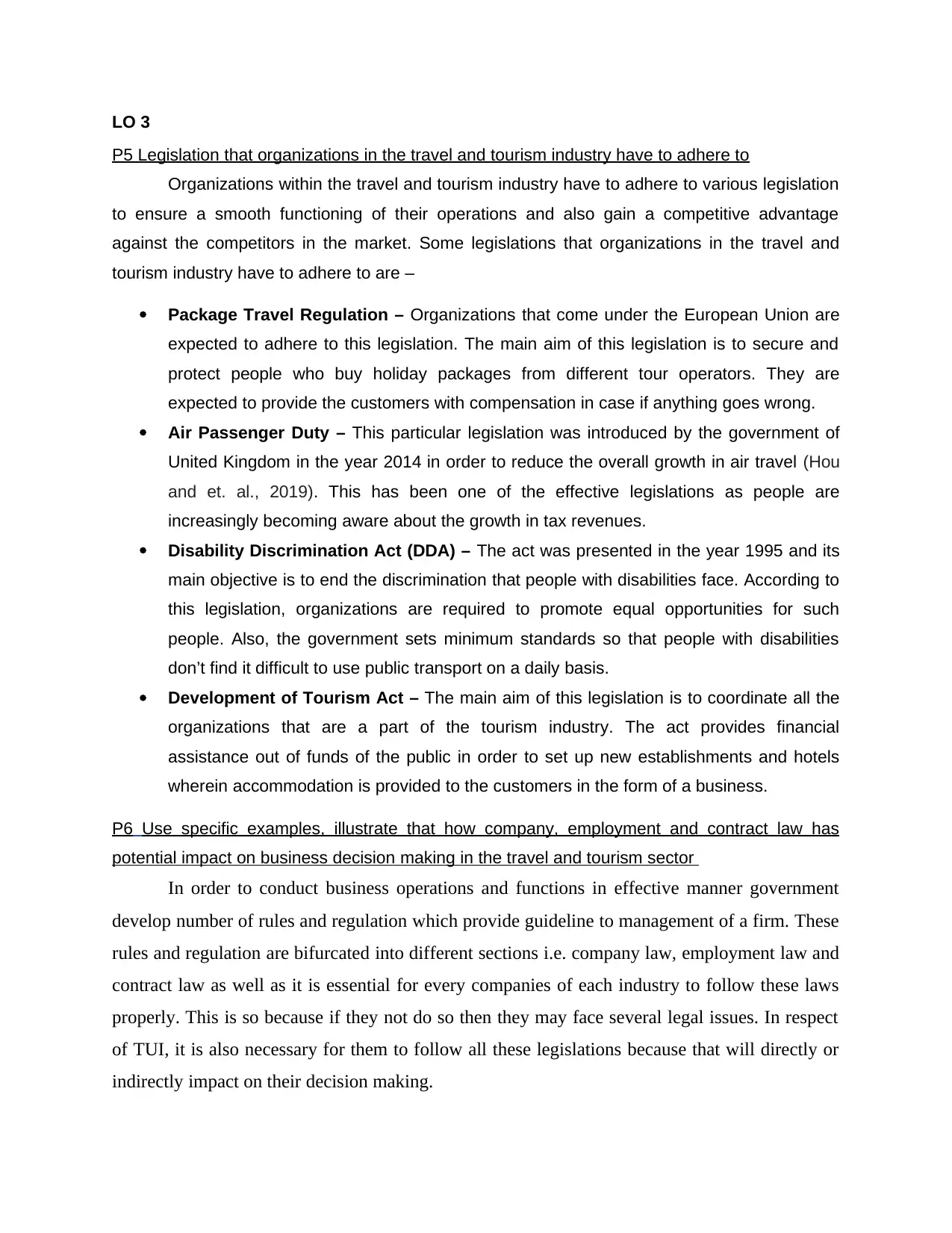
LO 3
P5 Legislation that organizations in the travel and tourism industry have to adhere to
Organizations within the travel and tourism industry have to adhere to various legislation
to ensure a smooth functioning of their operations and also gain a competitive advantage
against the competitors in the market. Some legislations that organizations in the travel and
tourism industry have to adhere to are –
Package Travel Regulation – Organizations that come under the European Union are
expected to adhere to this legislation. The main aim of this legislation is to secure and
protect people who buy holiday packages from different tour operators. They are
expected to provide the customers with compensation in case if anything goes wrong.
Air Passenger Duty – This particular legislation was introduced by the government of
United Kingdom in the year 2014 in order to reduce the overall growth in air travel (Hou
and et. al., 2019). This has been one of the effective legislations as people are
increasingly becoming aware about the growth in tax revenues.
Disability Discrimination Act (DDA) – The act was presented in the year 1995 and its
main objective is to end the discrimination that people with disabilities face. According to
this legislation, organizations are required to promote equal opportunities for such
people. Also, the government sets minimum standards so that people with disabilities
don’t find it difficult to use public transport on a daily basis.
Development of Tourism Act – The main aim of this legislation is to coordinate all the
organizations that are a part of the tourism industry. The act provides financial
assistance out of funds of the public in order to set up new establishments and hotels
wherein accommodation is provided to the customers in the form of a business.
P6 Use specific examples, illustrate that how company, employment and contract law has
potential impact on business decision making in the travel and tourism sector
In order to conduct business operations and functions in effective manner government
develop number of rules and regulation which provide guideline to management of a firm. These
rules and regulation are bifurcated into different sections i.e. company law, employment law and
contract law as well as it is essential for every companies of each industry to follow these laws
properly. This is so because if they not do so then they may face several legal issues. In respect
of TUI, it is also necessary for them to follow all these legislations because that will directly or
indirectly impact on their decision making.
P5 Legislation that organizations in the travel and tourism industry have to adhere to
Organizations within the travel and tourism industry have to adhere to various legislation
to ensure a smooth functioning of their operations and also gain a competitive advantage
against the competitors in the market. Some legislations that organizations in the travel and
tourism industry have to adhere to are –
Package Travel Regulation – Organizations that come under the European Union are
expected to adhere to this legislation. The main aim of this legislation is to secure and
protect people who buy holiday packages from different tour operators. They are
expected to provide the customers with compensation in case if anything goes wrong.
Air Passenger Duty – This particular legislation was introduced by the government of
United Kingdom in the year 2014 in order to reduce the overall growth in air travel (Hou
and et. al., 2019). This has been one of the effective legislations as people are
increasingly becoming aware about the growth in tax revenues.
Disability Discrimination Act (DDA) – The act was presented in the year 1995 and its
main objective is to end the discrimination that people with disabilities face. According to
this legislation, organizations are required to promote equal opportunities for such
people. Also, the government sets minimum standards so that people with disabilities
don’t find it difficult to use public transport on a daily basis.
Development of Tourism Act – The main aim of this legislation is to coordinate all the
organizations that are a part of the tourism industry. The act provides financial
assistance out of funds of the public in order to set up new establishments and hotels
wherein accommodation is provided to the customers in the form of a business.
P6 Use specific examples, illustrate that how company, employment and contract law has
potential impact on business decision making in the travel and tourism sector
In order to conduct business operations and functions in effective manner government
develop number of rules and regulation which provide guideline to management of a firm. These
rules and regulation are bifurcated into different sections i.e. company law, employment law and
contract law as well as it is essential for every companies of each industry to follow these laws
properly. This is so because if they not do so then they may face several legal issues. In respect
of TUI, it is also necessary for them to follow all these legislations because that will directly or
indirectly impact on their decision making.
Paraphrase This Document
Need a fresh take? Get an instant paraphrase of this document with our AI Paraphraser
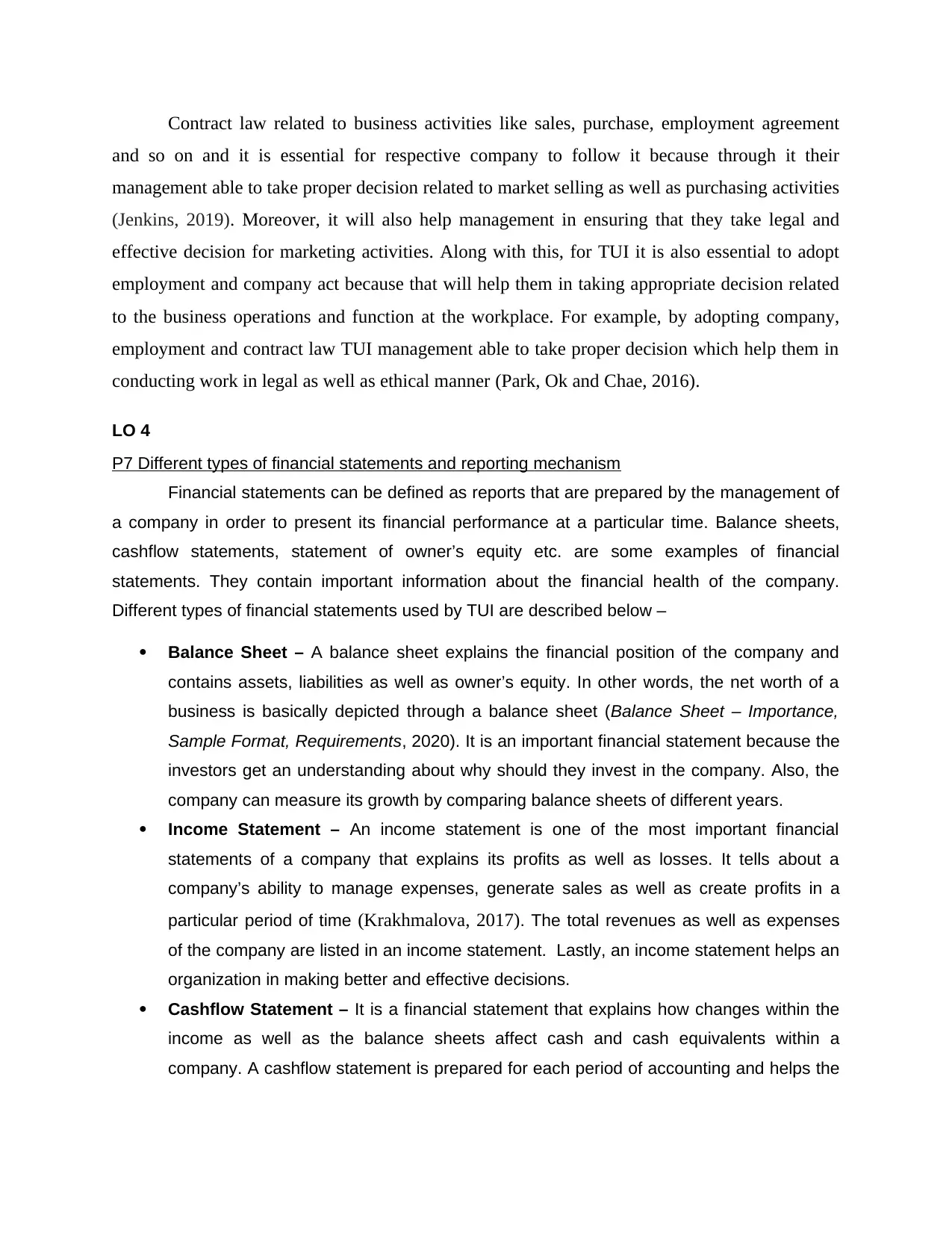
Contract law related to business activities like sales, purchase, employment agreement
and so on and it is essential for respective company to follow it because through it their
management able to take proper decision related to market selling as well as purchasing activities
(Jenkins, 2019). Moreover, it will also help management in ensuring that they take legal and
effective decision for marketing activities. Along with this, for TUI it is also essential to adopt
employment and company act because that will help them in taking appropriate decision related
to the business operations and function at the workplace. For example, by adopting company,
employment and contract law TUI management able to take proper decision which help them in
conducting work in legal as well as ethical manner (Park, Ok and Chae, 2016).
LO 4
P7 Different types of financial statements and reporting mechanism
Financial statements can be defined as reports that are prepared by the management of
a company in order to present its financial performance at a particular time. Balance sheets,
cashflow statements, statement of owner’s equity etc. are some examples of financial
statements. They contain important information about the financial health of the company.
Different types of financial statements used by TUI are described below –
Balance Sheet – A balance sheet explains the financial position of the company and
contains assets, liabilities as well as owner’s equity. In other words, the net worth of a
business is basically depicted through a balance sheet (Balance Sheet – Importance,
Sample Format, Requirements, 2020). It is an important financial statement because the
investors get an understanding about why should they invest in the company. Also, the
company can measure its growth by comparing balance sheets of different years.
Income Statement – An income statement is one of the most important financial
statements of a company that explains its profits as well as losses. It tells about a
company’s ability to manage expenses, generate sales as well as create profits in a
particular period of time (Krakhmalova, 2017). The total revenues as well as expenses
of the company are listed in an income statement. Lastly, an income statement helps an
organization in making better and effective decisions.
Cashflow Statement – It is a financial statement that explains how changes within the
income as well as the balance sheets affect cash and cash equivalents within a
company. A cashflow statement is prepared for each period of accounting and helps the
and so on and it is essential for respective company to follow it because through it their
management able to take proper decision related to market selling as well as purchasing activities
(Jenkins, 2019). Moreover, it will also help management in ensuring that they take legal and
effective decision for marketing activities. Along with this, for TUI it is also essential to adopt
employment and company act because that will help them in taking appropriate decision related
to the business operations and function at the workplace. For example, by adopting company,
employment and contract law TUI management able to take proper decision which help them in
conducting work in legal as well as ethical manner (Park, Ok and Chae, 2016).
LO 4
P7 Different types of financial statements and reporting mechanism
Financial statements can be defined as reports that are prepared by the management of
a company in order to present its financial performance at a particular time. Balance sheets,
cashflow statements, statement of owner’s equity etc. are some examples of financial
statements. They contain important information about the financial health of the company.
Different types of financial statements used by TUI are described below –
Balance Sheet – A balance sheet explains the financial position of the company and
contains assets, liabilities as well as owner’s equity. In other words, the net worth of a
business is basically depicted through a balance sheet (Balance Sheet – Importance,
Sample Format, Requirements, 2020). It is an important financial statement because the
investors get an understanding about why should they invest in the company. Also, the
company can measure its growth by comparing balance sheets of different years.
Income Statement – An income statement is one of the most important financial
statements of a company that explains its profits as well as losses. It tells about a
company’s ability to manage expenses, generate sales as well as create profits in a
particular period of time (Krakhmalova, 2017). The total revenues as well as expenses
of the company are listed in an income statement. Lastly, an income statement helps an
organization in making better and effective decisions.
Cashflow Statement – It is a financial statement that explains how changes within the
income as well as the balance sheets affect cash and cash equivalents within a
company. A cashflow statement is prepared for each period of accounting and helps the
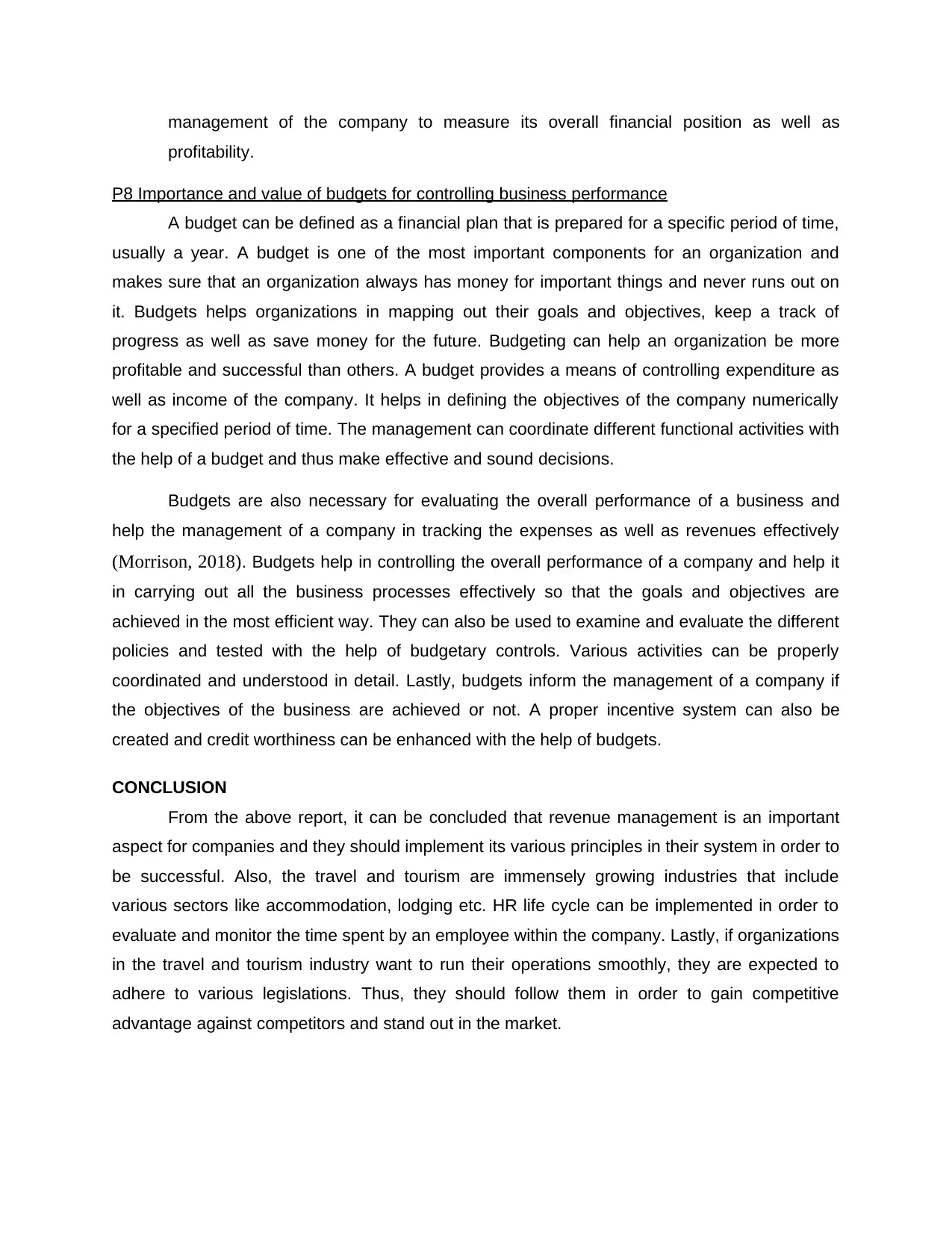
management of the company to measure its overall financial position as well as
profitability.
P8 Importance and value of budgets for controlling business performance
A budget can be defined as a financial plan that is prepared for a specific period of time,
usually a year. A budget is one of the most important components for an organization and
makes sure that an organization always has money for important things and never runs out on
it. Budgets helps organizations in mapping out their goals and objectives, keep a track of
progress as well as save money for the future. Budgeting can help an organization be more
profitable and successful than others. A budget provides a means of controlling expenditure as
well as income of the company. It helps in defining the objectives of the company numerically
for a specified period of time. The management can coordinate different functional activities with
the help of a budget and thus make effective and sound decisions.
Budgets are also necessary for evaluating the overall performance of a business and
help the management of a company in tracking the expenses as well as revenues effectively
(Morrison, 2018). Budgets help in controlling the overall performance of a company and help it
in carrying out all the business processes effectively so that the goals and objectives are
achieved in the most efficient way. They can also be used to examine and evaluate the different
policies and tested with the help of budgetary controls. Various activities can be properly
coordinated and understood in detail. Lastly, budgets inform the management of a company if
the objectives of the business are achieved or not. A proper incentive system can also be
created and credit worthiness can be enhanced with the help of budgets.
CONCLUSION
From the above report, it can be concluded that revenue management is an important
aspect for companies and they should implement its various principles in their system in order to
be successful. Also, the travel and tourism are immensely growing industries that include
various sectors like accommodation, lodging etc. HR life cycle can be implemented in order to
evaluate and monitor the time spent by an employee within the company. Lastly, if organizations
in the travel and tourism industry want to run their operations smoothly, they are expected to
adhere to various legislations. Thus, they should follow them in order to gain competitive
advantage against competitors and stand out in the market.
profitability.
P8 Importance and value of budgets for controlling business performance
A budget can be defined as a financial plan that is prepared for a specific period of time,
usually a year. A budget is one of the most important components for an organization and
makes sure that an organization always has money for important things and never runs out on
it. Budgets helps organizations in mapping out their goals and objectives, keep a track of
progress as well as save money for the future. Budgeting can help an organization be more
profitable and successful than others. A budget provides a means of controlling expenditure as
well as income of the company. It helps in defining the objectives of the company numerically
for a specified period of time. The management can coordinate different functional activities with
the help of a budget and thus make effective and sound decisions.
Budgets are also necessary for evaluating the overall performance of a business and
help the management of a company in tracking the expenses as well as revenues effectively
(Morrison, 2018). Budgets help in controlling the overall performance of a company and help it
in carrying out all the business processes effectively so that the goals and objectives are
achieved in the most efficient way. They can also be used to examine and evaluate the different
policies and tested with the help of budgetary controls. Various activities can be properly
coordinated and understood in detail. Lastly, budgets inform the management of a company if
the objectives of the business are achieved or not. A proper incentive system can also be
created and credit worthiness can be enhanced with the help of budgets.
CONCLUSION
From the above report, it can be concluded that revenue management is an important
aspect for companies and they should implement its various principles in their system in order to
be successful. Also, the travel and tourism are immensely growing industries that include
various sectors like accommodation, lodging etc. HR life cycle can be implemented in order to
evaluate and monitor the time spent by an employee within the company. Lastly, if organizations
in the travel and tourism industry want to run their operations smoothly, they are expected to
adhere to various legislations. Thus, they should follow them in order to gain competitive
advantage against competitors and stand out in the market.
⊘ This is a preview!⊘
Do you want full access?
Subscribe today to unlock all pages.

Trusted by 1+ million students worldwide
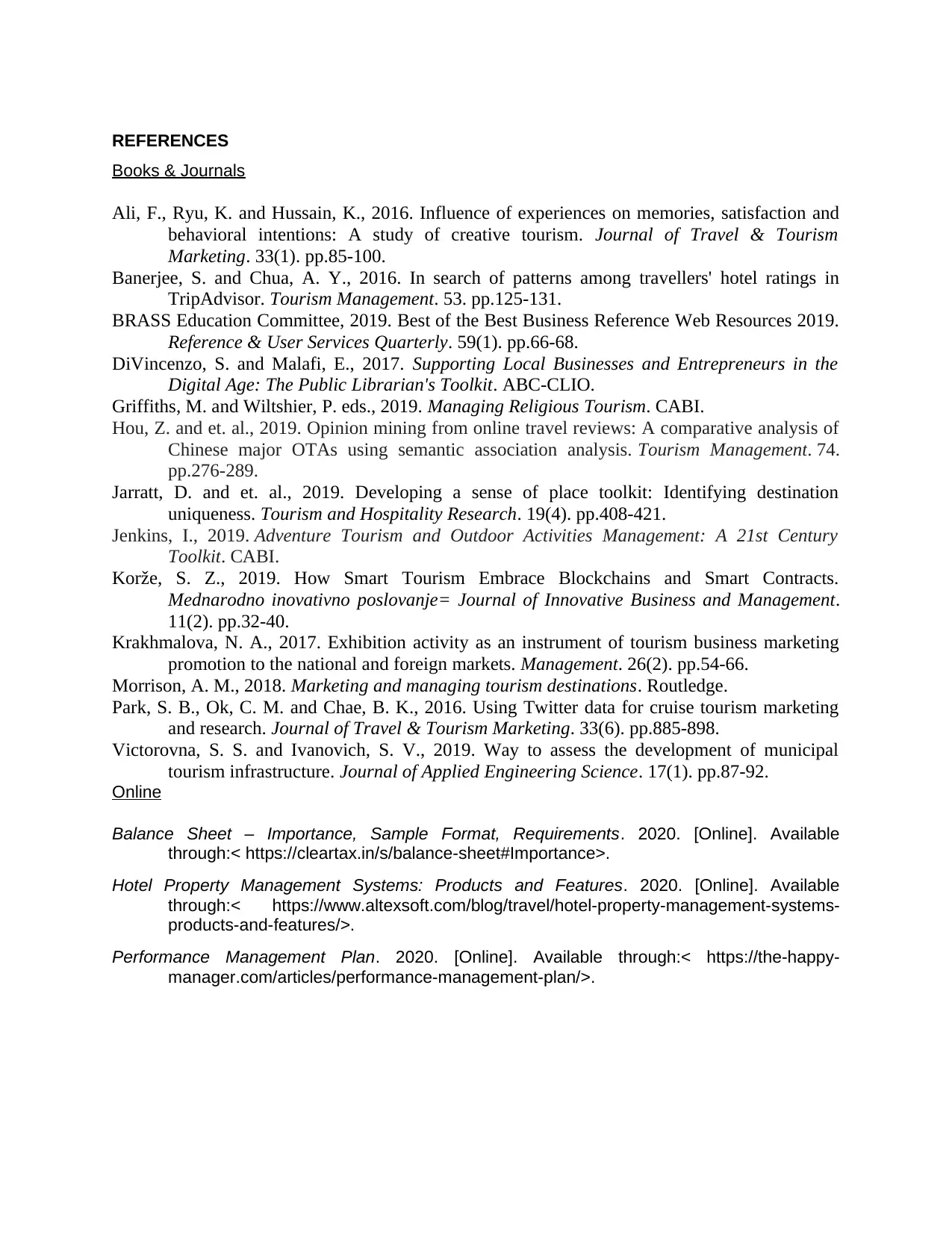
REFERENCES
Books & Journals
Ali, F., Ryu, K. and Hussain, K., 2016. Influence of experiences on memories, satisfaction and
behavioral intentions: A study of creative tourism. Journal of Travel & Tourism
Marketing. 33(1). pp.85-100.
Banerjee, S. and Chua, A. Y., 2016. In search of patterns among travellers' hotel ratings in
TripAdvisor. Tourism Management. 53. pp.125-131.
BRASS Education Committee, 2019. Best of the Best Business Reference Web Resources 2019.
Reference & User Services Quarterly. 59(1). pp.66-68.
DiVincenzo, S. and Malafi, E., 2017. Supporting Local Businesses and Entrepreneurs in the
Digital Age: The Public Librarian's Toolkit. ABC-CLIO.
Griffiths, M. and Wiltshier, P. eds., 2019. Managing Religious Tourism. CABI.
Hou, Z. and et. al., 2019. Opinion mining from online travel reviews: A comparative analysis of
Chinese major OTAs using semantic association analysis. Tourism Management. 74.
pp.276-289.
Jarratt, D. and et. al., 2019. Developing a sense of place toolkit: Identifying destination
uniqueness. Tourism and Hospitality Research. 19(4). pp.408-421.
Jenkins, I., 2019. Adventure Tourism and Outdoor Activities Management: A 21st Century
Toolkit. CABI.
Korže, S. Z., 2019. How Smart Tourism Embrace Blockchains and Smart Contracts.
Mednarodno inovativno poslovanje= Journal of Innovative Business and Management.
11(2). pp.32-40.
Krakhmalova, N. A., 2017. Exhibition activity as an instrument of tourism business marketing
promotion to the national and foreign markets. Management. 26(2). pp.54-66.
Morrison, A. M., 2018. Marketing and managing tourism destinations. Routledge.
Park, S. B., Ok, C. M. and Chae, B. K., 2016. Using Twitter data for cruise tourism marketing
and research. Journal of Travel & Tourism Marketing. 33(6). pp.885-898.
Victorovna, S. S. and Ivanovich, S. V., 2019. Way to assess the development of municipal
tourism infrastructure. Journal of Applied Engineering Science. 17(1). pp.87-92.
Online
Balance Sheet – Importance, Sample Format, Requirements. 2020. [Online]. Available
through:< https://cleartax.in/s/balance-sheet#Importance>.
Hotel Property Management Systems: Products and Features. 2020. [Online]. Available
through:< https://www.altexsoft.com/blog/travel/hotel-property-management-systems-
products-and-features/>.
Performance Management Plan. 2020. [Online]. Available through:< https://the-happy-
manager.com/articles/performance-management-plan/>.
Books & Journals
Ali, F., Ryu, K. and Hussain, K., 2016. Influence of experiences on memories, satisfaction and
behavioral intentions: A study of creative tourism. Journal of Travel & Tourism
Marketing. 33(1). pp.85-100.
Banerjee, S. and Chua, A. Y., 2016. In search of patterns among travellers' hotel ratings in
TripAdvisor. Tourism Management. 53. pp.125-131.
BRASS Education Committee, 2019. Best of the Best Business Reference Web Resources 2019.
Reference & User Services Quarterly. 59(1). pp.66-68.
DiVincenzo, S. and Malafi, E., 2017. Supporting Local Businesses and Entrepreneurs in the
Digital Age: The Public Librarian's Toolkit. ABC-CLIO.
Griffiths, M. and Wiltshier, P. eds., 2019. Managing Religious Tourism. CABI.
Hou, Z. and et. al., 2019. Opinion mining from online travel reviews: A comparative analysis of
Chinese major OTAs using semantic association analysis. Tourism Management. 74.
pp.276-289.
Jarratt, D. and et. al., 2019. Developing a sense of place toolkit: Identifying destination
uniqueness. Tourism and Hospitality Research. 19(4). pp.408-421.
Jenkins, I., 2019. Adventure Tourism and Outdoor Activities Management: A 21st Century
Toolkit. CABI.
Korže, S. Z., 2019. How Smart Tourism Embrace Blockchains and Smart Contracts.
Mednarodno inovativno poslovanje= Journal of Innovative Business and Management.
11(2). pp.32-40.
Krakhmalova, N. A., 2017. Exhibition activity as an instrument of tourism business marketing
promotion to the national and foreign markets. Management. 26(2). pp.54-66.
Morrison, A. M., 2018. Marketing and managing tourism destinations. Routledge.
Park, S. B., Ok, C. M. and Chae, B. K., 2016. Using Twitter data for cruise tourism marketing
and research. Journal of Travel & Tourism Marketing. 33(6). pp.885-898.
Victorovna, S. S. and Ivanovich, S. V., 2019. Way to assess the development of municipal
tourism infrastructure. Journal of Applied Engineering Science. 17(1). pp.87-92.
Online
Balance Sheet – Importance, Sample Format, Requirements. 2020. [Online]. Available
through:< https://cleartax.in/s/balance-sheet#Importance>.
Hotel Property Management Systems: Products and Features. 2020. [Online]. Available
through:< https://www.altexsoft.com/blog/travel/hotel-property-management-systems-
products-and-features/>.
Performance Management Plan. 2020. [Online]. Available through:< https://the-happy-
manager.com/articles/performance-management-plan/>.
1 out of 10
Related Documents
Your All-in-One AI-Powered Toolkit for Academic Success.
+13062052269
info@desklib.com
Available 24*7 on WhatsApp / Email
![[object Object]](/_next/static/media/star-bottom.7253800d.svg)
Unlock your academic potential
Copyright © 2020–2026 A2Z Services. All Rights Reserved. Developed and managed by ZUCOL.





